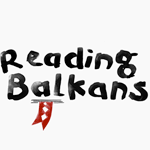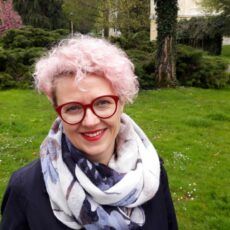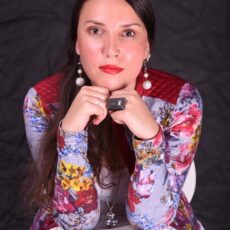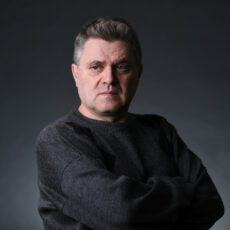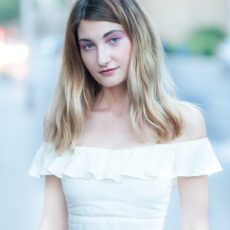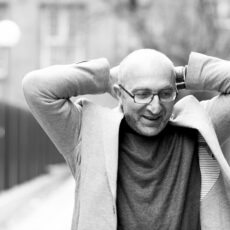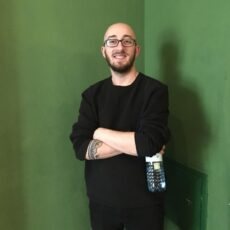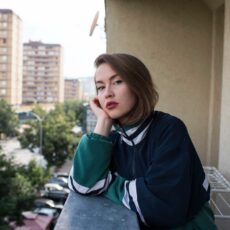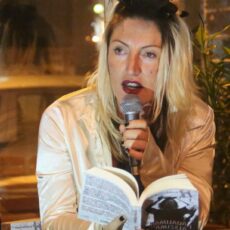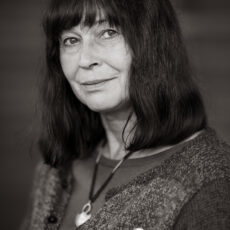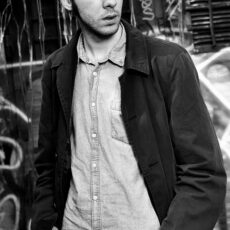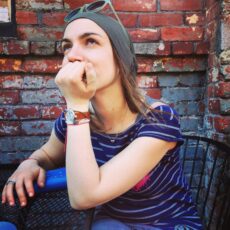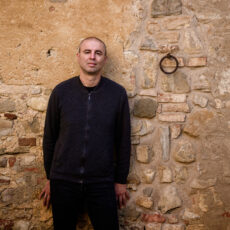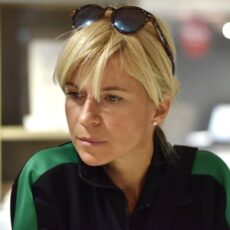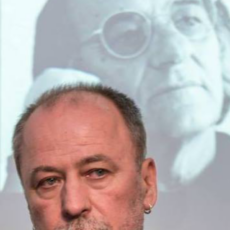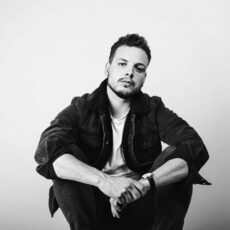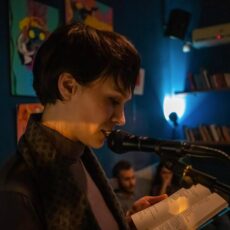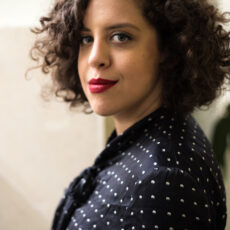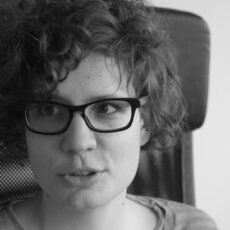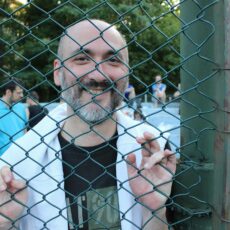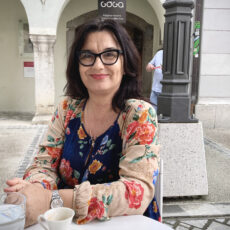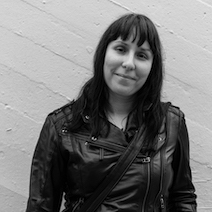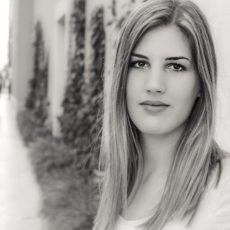Nikolay Boykov (1968, Bulgaria) studied Hungarian philology and has had a range of jobs, as a cook, truck loader, interpreter in a sewing factory, librarian, teacher of Hungarian, journalist, model at an art academy, book and newspaper deliverer, copywriter, bookseller, translator, guard, window cleaner, childcare worker, courier, franchise provider, PR and advertising assistant, helper to people with physical disabilities, editor, waiter, and bartender. He writes poetry as well as prose. At the invitation of Traduki, he participated at the 2018 Leipzig Book Fair. He also organised a festival and symposium about queer life and literature in Central and Eastern Europe at the Literarisches Colloquium Berlin.
Briefe an Petăr (Auszüge)
25. Januar
Heute, auf dem Heimweg von der „Matrix“, begann ich wieder, sieh mich nicht so an, Junge zu trällern, aber statt und jeder deiner Blicke ist ein Ruf ertappte ich mich dabei, wie ich jeder meiner Blicke sang, es war gegen kurz nach neun, die Spatzen unter meinem Fenster hatten bereits ausgezwitschert, ich hatte bereits nach der Post gesehen und würde zu Hause in dem Buch Der Affe auf dem Fahrrad von Ágnes Heller lesen (während des Lesens würde mir eine Träne über die Wange kullern, zur völlig falschen Zeit, unangebracht, aus dem Kontext gerissen, offenbar ganz und gar zusammenhanglos), aus diesem Buch würde ich mir auf Ungarisch einige Sätze wie die folgenden notieren: wie sowohl Lukács als auch Solschenizyn gesagt haben sollen, dem Hund einen hündischen Tod und dass der Mörder ein Mörder bleibt, selbst wenn er einen Mörder ermordet, darüber, dass der ehrliche und anständige Mensch gewinnt, selbst wenn er verliert, darüber, wie sie im Alter von achtzehn beschlossen habe, dass sie auf dieser Welt eine Berufung hat: die Nuss zu knacken, und die Nuss ist die Wahrheit, die Wahrheit über die Dinge, über die Menschen und das Sein, darüber, was in uns steckt, wie sie aber später begriffen habe, dass es keine Wahrheit gibt, und so gebe es auch nichts zu erkennen, sie habe verstanden, dass die Unmöglichkeit, die Nuss zu knacken, Teil des Nussknackens ist, letzteres habe ich irgendwie nicht verstanden, ich hatte mir bereits vorher einen Lindenblütentee gemacht und einen halben Becher Joghurt mit einer Scheibe Brot gefrühstückt, später würde ich Krautsalat zu Mittag essen, wieder mit Joghurt, ich hatte bereits und wieder Ani Ilkov gelesen: Gestern wurde ich nachdenklich und sagte mir: Ich werde / nichts aufschreiben – die Wörter sind leer. / Dann ging ich spazieren, kaufte mir etwas zum Abendessen / und begann alles von vorn / mit einem Brief, in dem ich mich nicht beklagen würde, und ich würde in der Markthalle und auf dem Frauenmarkt einkaufen gehen, wo ich mir Pfefferminz- und Kamillentee kaufen würde und einen aus Bergkräutern, ich würde auch versuchen, mir eine Stange Salami zu kaufen, und verlangen, dass man sie für mich aufschneidet, man würde ablehnen, ich würde mich ärgern, wir würden ein wenig streiten, Bürger würden sich empören, dass ich die Schlange aufhalte, ich würde verärgert weggehen, ohne mir Salami zu kaufen, aber mir würde einfallen, einer Freundin vorzuschlagen, eine Reihe von Beiträgen für einen Fernsehsender zu machen, sagen wir mit dem Titel kein Kommentar, wo wir filmen, wie ich verlange, dass man mir die Salami aufschneidet, man das aber ablehnt, ich würde sie später auf dem Heimweg, nachdem ich Äpfel, Orangen, Mandarinen, zwei Pampelmusen, Karotten, Kartoffeln, Zwiebeln, frische Petersilie, frischen Dill und zwei Paprikaschoten gekauft habe, treffen und ihr auf die Schnelle von meiner Idee erzählen, und wir würden vereinbaren, uns morgen zu sehen und alles ausführlich zu besprechen, ich hatte bereits die neuen Postkarten mit Rätseln für Trjavna gezeichnet, und auf dem Weg zur Post würde ich einen Buntstift kaufen, um das Geschenk für Kamen fertig zu verpacken: ein Buch mit Geschichten – Lügenmärchen, ein Heft, ein ganz gewöhnlicher Kugelschreiber, all das in einer durchsichtigen Kunststoffmappe, und ein Rasierset von Gillette (ein übriggebliebenes Weihnachtsgeschenk, das ich ohnehin nicht benutzen würde: ein Rasierer mit einigen Klingen, Schaum, Aftershave (?)), ich hatte bereits eines meiner Geburtstagsgeschenke im Eissalon in der Angel-Kănčev-Straße bekommen: eine wohlriechende runde Kerze, und ich würde einen Abstecher zur Buchhandlung Bibliopolis auf der Solunska-Straße machen, um abzusprechen, wann ich meine Postkarten für die Interessenten an meinen Postkarten zeichnen sollte, falls es solche gab natürlich, ich hatte bereits meinem Freund eine Antwort auf das geschrieben, was er mir geschrieben hatte, dass sehr schön sei, was ich ihm in meinem letzten Brief beschrieben hatte: wie wir uns einen Film angeschaut hatten, ob jetzt Die Einsamen oder Die Einfältigen, wie wir nebeneinander saßen und sich unsere Schultern von Zeit zu Zeit berührten, leicht und zart, und ich fühlte, wie er einatmete, und ich fühlte, wie er fühlte, dass ich einatmete, ich fühlte, wie sein Atem schneller wurde und meiner ihn einholte oder meiner vorauseilte und seiner ihn einholte, wie sie sich einholten und überholten, sich übersprangen und wir dann an der Stelle, wo unser Einatmen und Ausatmen eins hätten sein sollen, leicht und zart voneinander abrückten, und ich hatte ihm bereits mit einem ungarischen Schlager geantwortet: Die Liebe dauert eine Woche (wenn wir dieses Lied im Unterricht durchnehmen, gibt es ein Lehrbuch auf Ungarisch: Nicht nur Lieder, immer am Anfang, noch bevor klar wird, worum es geht, frage ich, das ist die erste Aufgabe der Lektion: was dauert eurer Meinung nach eine Woche?), ich hatte bereits zu einem anderen Freund gesagt: alles ist vorbei, auch diese Liebe ist vorbei, aber ich bin verliebt und das bedeutet auch kreativ, ich hatte bereits einen Brief geschrieben, mit dem ich bereits gegen jenes von mir Ausgesprochene verstieß, nämlich dass ich Dir nicht schreiben würde, und ich würde mir eine grüne Diskette aussuchen, um auf ihr diese Briefe von mir zu speichern (Briefe an Petăr), ich hatte bereits alle möglichen Sachen gemacht und würde andere machen, ich war auf dem Boulevard Neofit-Rilski nach Hause unterwegs, und dann, während ich und jeder meiner Blicke ist ein Ruf, ti-da-da-ti-da-ti-ta-ta-ti-da vor mich hin trällerte, sagte ich mir, da beschloss ich, damit anzufangen, Dir diese Briefe zu schreiben und nicht darauf zu warten, eine Antwort von Dir zu erhalten.
30. Januar
Nachdem wir gestern Wolken über dem Ganges gesehen hatten, stand irgendein Freund aus Deiner Kindheit zwischen uns, dessen Namen ich mir nicht gemerkt habe, der kurz vor seinem Abschluss in Jura stand, aber immer noch nicht wusste, was aus ihm werden sollte, wenn er einmal „groß“ wäre, wir hatten uns zufällig an der Bushaltestelle bei der Uni getroffen, ich war auf dem Weg ins Ungarische Kulturinstitut und hatte es eilig, hatte Dich gerade von der Šipka-Straße aus auf dem Handy angerufen, und wir hatten verabredet, uns in zwanzig Minuten vor dem Kulturinstitut zu treffen (inzwischen weiß ich, warum die Leute auf der Straße herumirren und in ihr Telefon brüllen: Wo bist du?), Du begannst zu schreien, ich kam zurück, dann verscheuchte ich für einen Moment den Freund aus Kindertagen, um Deine Erlaubnis einzuholen, diese Briefe zu veröffentlichen, dann saßen wir getrennt da, und ich holte gleich zu Beginn das rote Klemmbrett im halben A4-Format und den grünen Kugelschreiber hervor, den ich immer dabei habe, um die Adressen auf die Postkarten zu schreiben, die ich verschicke, nur ihn konnte ich in meinem Tornister erstasten, ich saß im dunklen, aber immerhin ausreichend hellen Saal und schrieb so, wie ich früher einmal in Brief nach Amerika im Euro-Bulgarischen Zentrum geschrieben und geschluchzt hatte: Der Ort ist trist, aber ich lasse mich nicht von ihm runterziehen … Habe ich ihm gesagt, dass ich … Inmitten so vieler Menschen … Doch Du wirst aufwachen und mir verzeihen, doch ich werde aufwachen und mir verzeihen, doch Du wirst aufwachen und Dir verzeihen, ich schrieb im Salon des Ungarischen Kulturinstituts, was auf dem Bildschirm zu hören war (wie immer, wenn sie auf Ungarisch Mutterflüche ausstießen, auf Bulgarisch nur – zum Teufel): Über das Existierende sprechen und über das Nichtexistente schweigen, ich hatte mir bereits in Christentum und Kultur Nr. 4/2000 das eine Motto von Wittgenstein notiert, das ich in den Händen eines Mädchens erblickte, sie zeigte ihren Freundinnen ihre Klausurarbeit: Ich bin meine Welt, und die Nummer des anderen, das mir zu lesen nicht gelang, 5.621, während ich jetzt diese Zeilen schreibe, finde ich es: Die Welt und das Leben sind Eins (jetzt verstehe ich jenen Satz, den Bojan Mančev auf der Ivan-Asen-Straße zu mir sagte, nämlich dass ich ein ziemlicher Wittgenstein-Typ sei); heute Morgen, als ich irgendwo gegen zehn vor zwei aufwachte, konnte ich mich nicht hinsetzen, um zu schreiben oder zu übersetzen, mein Computer war kaputtgegangen, also begann ich, darin zu lesen, das Christentum und die Kultur, begann zu unterstreichen, womit ich einverstanden war und womit nicht, auf seine Fragen zu antworten, meine eigenen Fragen zu stellen: warum die religiös Gläubigen das Wort Gläubige für sich beanspruchen und alle übrigen als Ungläubige bezeichnen, bedeutet die Tatsache, dass ich nicht an ihren Gott glaube, dass ich an nichts glaube, ist es wahr, dass ich zwischen Glaube und Unglaube wähle, vertauscht die Frage glaube ich, die man mir dort stellt, nicht die Kategorien, vielleicht lautet die Frage glaube ich an Gott und vielleicht genauer glaube ich an den christlichen Gott und vielleicht noch genauer – an diesen auf den ersten Seiten ins Auge gefassten christlichen Gott: der hyperwirkliche und hypermögliche soll es sein, der wundervolle, der Gott, dessen Jenseitigkeit und apostrophierende Verborgenheit augenscheinlich sind für Kalin Janakiev (ich persönlich glaube nicht an den Christengott und glaube nicht der bzw. an die Unaussprechlichkeit dieses Unglaubens wie Aleksandăr Kjosev, ich halte mein irdisches Dasein als Mensch für ein Leben unter anderen, für ein Leben mit den anderen, und aus dieser Perspektive bin ich der Meinung, dass es nicht gut ist, an diesen Gott zu glauben, weder für mich selbst noch für die anderen, ich meine, dass dieser Gott ein Gott der Erpressung und der Machtausübung durch das Opfer ist, durch das Zuschreiben von Schuld, durch eine durch nichts gezeigte, durch nichts bewiesene Liebe, ein Gott der doppelten Standards und der Unvollständigkeit, ein Gott der Verankerung der Ungleichstellung, denken wir nur an das Folgende: jemand erschafft meine eventuellen Vorfahren nach seinem Bild, als sein Ebenbild, wobei er ihnen das Recht vorenthält, Gut von Böse zu unterscheiden, danach bestraft er sie unwiderruflich und endgültig für die von ihnen begangene Sünde und nicht nur sie persönlich, sondern auch alle anderen, wie in der Kaserne: da hat einer angeblich einen Fehler gemacht und hopp alle runter in den Entengang, am Ende habe er, weil er mich liebt, seinen einzigen Sohn geopfert, um mich zu retten, und ich sei angeblich frei, aber ich bin nur frei, das zu wählen, was er für mich ausgewählt hat, ganz zu schweigen davon, dass im Falle, dass ich nach seinem Bild und als sein Ebenbild geschaffen worden bin, die Möglichkeit zu sündigen von nirgendwo anders kommen kann als von ihm, und weil er sich nicht selbst bestrafen kann oder will, bestraft er mich für etwas, an dem ich keinerlei konkrete Schuld trage, und dann rettet er mich auch noch wegen dieser völlig unkonkreten Schuld, indem er seinen geliebten Sohn opfert, denken wir uns Folgendes: wenn eines seiner Gebote lautet du sollst nicht töten, und da gibt es keine zwei Meinungen, das ist klar und deutlich ausgesprochen worden, wozu waren dann all diese Kriege und Kreuzzüge im Namen Christi gut, warum versuchen all jene, die sich als christliche Politiker ausweisen, nicht klar und deutlich, die Massenvernichtungswaffen abzuschaffen, wieso sollte ein doch so gläubiger christlicher Anführer einer Weltmacht im Augenblick andere aussenden, um zu töten, und ganz offensichtlich werden sie töten, obwohl es dort in einfachen und klaren Worten heißt: du sollst nicht töten.), ich las und antwortete also in den Marginalien auf die Fragen, zum Beispiel: 7. Wenn Sie als Ungläubiger der Überzeugung sind, dass Sie kein Bedürfnis nach einem Subjekt haben, das über der Welt und über dem Möglichen steht, könnten Sie dann versuchen zu sagen, womit Ihnen dieses Dasein hier und jetzt ausreicht, damit Sie kein solches Bedürfnis haben?: Ich kann, wenn ich ich selbst bin, wenn ich ganz bin, wenn ich authentisch bin, wenn ich morgens die mich anzwitschernden Spatzen höre, wenn ich manchmal, Schulter an Schulter mit einem geliebten Menschen, fühle, wie unser Atem sich verfolgt und verstrickt, sich überspringt und überholt, wenn ich das Lächeln des anderen sehe und sein Lachen höre, wenn ich Lammsuppe in der „Prärie“ esse, wenn ich morgens zusehe, wie es dämmert, wie die Wolken langsam und gelassen in irgendeine Richtung davonschweben und die Sonnenstrahlen ihren Schleier durchstoßen, wenn die Kinder in Trjavna … mir fehlen die richtigen Worte … wenn der Wind mein Gesicht gerbt, wenn ich mit Attila Jász geschwiegen habe und den Raum nicht mit Worten füllen musste, wenn ich irgendwann in Jahr 2000 Ofenkartoffeln in der Talschlucht bei den Plattenbauten von Mladost 2 gegessen habe, wenn ich selbst das schreiben kann, warum sollten mir diese Dinge nicht ausreichen, und warum sollten sie mich dazu bringen, an einen verborgenen Gott zu glauben (der seine Anwesenheit verweigert), und wenn dieser Gott jenseitig und verborgen ist, nicht sichtbar und nicht anwesend, ist dann nicht auch meine Verweigerung des seine Anwesenheit Verweigernden eine Gesetzmäßigkeit; ich kritzelte also die Zeitschrift mit meinen Fragen und meinen Antworten voll (kann etwas ein Dialog sein, wenn wir wissen, wohin wir uns entwickeln werden, ist der Dialog nicht der bekannte Ort, von dem aus wir uns auf den Weg machen, ohne zu wissen, wohin wir gehen, offen für die Veränderung und das Verstehen der anderen, offen für das Risiko, ein anderer zu sein, der Ort, wo unsere eigenen Wahrheiten auf die Probe gestellt werden und wo wir neue finden), ich las also und kritzelte auf die Blätter des Christentums und der Kultur, danach schlief ich, trank Kaffee, las Der Affe auf dem Fahrrad (Auch ich pflegte zu sagen, dass die Richtung und der Ort der Rettung die Revolution des alltäglichen (unerlässlichen) Lebens sind, wir sollten uns mit dem beschäftigen, was wir können, mit der vollständigen Veränderung unseres Lebens, wir müssen für uns selbst, in unserer eigenen Handlungssphäre das menschliche Leben erschaffen, hier und jetzt leben und mit und unter diesen Menschen wirken), später kam Kamen und reparierte meinen Computer, er war irgendwie verstaubt gewesen, und jetzt schreibe ich diese Zeilen auf ihm, draußen hat es begonnen, weiß zu schneien, und gestern kam ich allein nach Hause, beschleunigte meine Schritte auf der Straße des 6. September (Dein Freund aus Kindertagen und Du, ihr hattet es eilig, irgendwohin zu kommen), und ich schluchzte so, wie Krum Filipov im Marmorsalon des Russischen Kulturinstituts geschluchzt hatte bei der von Levčev organisierten Lesung, während er dieses Gedicht über seine Großeltern vortrug.
Aus dem letzten Brief, 2. August 11:24 Uhr – 11. August 21:36 Uhr
… ich ging in Richtung Zentrum, unterwegs schrieb ich E-Mails, kam zum „Parnas“, sie hatten die CD mit den Folksongs eingelegt, Mitternacht war schon vorbei, zwei junge Männer saßen an der Bar, der eine trank einen möglicherweise alkoholischen Cocktail mit Fruchtsaft, er hatte ein rundliches Gesicht, war kurzgeschoren, seine Bewegungen waren weich und zart, dauernd hatte er dem anderen etwas zu erklären, der sich im einen Augenblick mit den Fingern durchs Haar fuhr, um sich im nächsten umzusehen und dann einen Schluck von seiner Cola zu nehmen, wir saßen also an der Bar, Galja, Megi, ich und Toma, lauschten der Kompilation, ich holte mein rotes Klemmbrett zum Schreiben hervor, schrieb die Songtexte auf, Toma redete unablässig auf mich ein, ich konnte ihn nicht verstehen, ich schrieb So viele Wahrheiten habe ich begriffen, so viel Schmerz durchlitten, und wie einen Phoenix in der Asche vergrub ich die Liebe in mir, Toma hörte nicht auf, von Tranströmer zu erzählen, der gesagt habe, dass er in seinem Schatten getragen werde wie eine Geige in ihrem Geigenkasten, und wie hammermäßig das sei, ich betrachtete den jungen Mann mit dem runden Gesicht, ab und zu durchfuhr seine Hände ein zartes und weiches Zucken, meine Hände strichen weich und zart den Tresen glatt, manchmal legte er seine Hand auf die des anderen, sie sangen von Liebe, die nur mit dir süß wie Honig ist, von den drei Worten, von Bestrafung durch Betrug, von Armen, die andere umschlingen, von Lippen, die andere küssen, von offenen Wunden, wir ließen die CD laufen, ich wünschte mir das erste Lied: so viele Wahrheiten habe ich begriffen, so viel Schmerz durchlitten (heute, am fünfundzwanzigsten, werde ich gegen später wieder auf einen Sprung ins „Parnas“ gehen, ob ich jetzt meine Mails gecheckt habe oder nicht, ich werde die Fürst-Boris-Straße entlanggehen, die Bäume, die ihre Äste über mir ineinander verflochten haben, werden in Sonne baden, ich werde gehen, werde den Blick heben, werde mitverfolgen, wie das Grün der Blätter immer heller wird, immer sonniger, immer strahlender, ich werde gehen und werde die sonnenbeschienenen, die in den Wipfeln aufleuchtenden Blätter betrachten, so wie ich sie früher schon einmal an einem anderen Morgen betrachtet hatte, ich war auch damals auf dem Weg ins „Parnas“, ich schaute auch damals bei Toma vorbei, er schlief, also machte ich einen Abstecher nach Bistrica, in die „Matrix“, auf dem Rückweg rief beim Kino „Mir“ irgendeine Musik nach mir, jemand spielte Klavier, ich blieb am Eingang des Aquariums stehen, ein Spatz flog über der Straße von einem Hausdach zum anderen, danach war der Flügelschlag einer Taube zu hören, ein gebeugter alter Mann ging vorbei, hielt eine vornübergebeugte, schwächliche Enkelin an der Hand, ein Briefträger, der in seiner riesigen Tasche wühlte, dann war ich auf einmal irgendwie drinnen, bat mich inständig selbst, ein Weilchen zuzuhören, saß mit dem Rücken zum Klavier und zum Klavierspieler, zeichnete einen Vogel für den Klavierspieler, hörte, wie er etwas probierte, wie die Töne einander verfolgten und einholten, einander überholten, in der Musik lag Trauer und Mattigkeit, auch Melancholie und Sich-Verzehren, die Töne holten einander ein, zogen aneinander vorbei, vereinten sich, dann betrachte ich, sehe Flecken, sie schimmern feucht, vor dem Schaufenster – der Besen mit dem metallisch schimmernden Stiel, am Ende des Salons zwei Eimer Wasser, ein roter und ein weißer, mit Ausgüssen, einander zugewandt, die Töne schweben, haben das Herz gerufen, ich sehe mich um, die Augen füllen sich mit Tränen, ich schlucke, die Töne verfolgen einander, holen einander ein, überholen einander, vereinen sich, Menschen gehen draußen vor dem Aquarium vorbei, manche werfen einen Blick hinein, niemand bleibt stehen, zwei Tränen lösen sich, der Junge hört auf zu spielen, ich frage ihn, wessen Musik das ist, es ist meine, sagt er, dann läuft er verlegen auf und ab und stammelt, dass auch er arbeiten muss, ich drücke ihm die Zeichnung in die Hand – ein Vogel und der blühende Ast eines Baums, ich laufe auf und ab, gehe hinaus, im „Parnas“ schläft Toma noch, ich mache mich auf den Heimweg, ich werde die Fürst-Boris-Straße nehmen, unter den Bäumen, grün und gelb eingefärbt, ich werde etwas vor mich hin trällern, dann wird es mir einfallen, es ist Lija von Kondjo und Lija, die über die Wahrheiten und die Schmerzen singt, ich werde das Lied anstimmen, es aber nicht bis zum Schluss singen können, meine Stimme wird versagen, wird zittern, wird sich schon beim Wort Wahrheiten verschlucken, und bei Schmerz wird sie beinahe flüstern, ich werde einen Abstecher machen, um es noch einmal zu hören, es wird nicht gehen, macht nichts, ein andermal, werde ich sagen) (früher, ich werde mit Plamen Antov und György im Aquarium des Ungarischen Kulturinstituts sitzen bei der Präsentation der ungarischen Theaternummer der Zeitschrift Panorama, sie werden irgendetwas erzählen, ein übertrieben fröhliches Mädchen, das vor mir sitzt, offenbar zugekifft, wird mich fragen, bist du ’ne Schwuchtel, schon vom ersten Mal an, werde ich ihr antworten, ohne überhaupt darüber nachzudenken, ja, ich bin homosexuell, wir werden also im Ungarischen Kulturinstitut sitzen, ich werde für Antov ein blühendes Bäumchen zeichnen, ich erinnere mich nicht mehr, ob die Blüten weiß waren oder blau, und hinten auf dem Stückchen Pappe werde ich in etwa Folgendes skizzieren: wir saßen im Aquarium des Ungarischen Kulturinstituts, zwei Jungen in schwarzen Pullovern kamen vorbei, die Menschen draußen konnte ich nur von der Taille aufwärts sehen, sie waren ziemlich klein, jung, hübsch, mit modernen Frisuren, offenen Gesichtern und lebendigen Augen, der eine näherte sich der Scheibe, starrte hinein, der andere winkte lässig ab und legte lässig den Arm um ihn und zog ihn lässig an sich, und lässig jung, schön und echt gingen sie weiter), wir werden also im „Parnas“ sitzen, werden uns die Folkkompilation anhören, die anderen wünschten sich ebenfalls ihr Lied, ein Wunschkonzert, sie sangen: Wo bist du in dieser Stunde, wo bist du in diesem Augenblick, hör meine Stimme, hör meinen Ruf … Sieh mir in die Augen und sag mir, dass du mich liebst …, wie geht es Tante Klara, wird Toma fragen, es geht ihr gut, heute hatten wir ein festliches Mittagessen zur Feier des Tages (sie hatten mir Buletten und panierte Paprikaschoten geschickt, Mayonnaise mit Quark, ich bot ihr an, gemeinsam zu Mittag zu essen, sie schlug vor, eine Gurken-Joghurt-Suppe zu machen, wir machten eine, deckten den Tisch, Servietten mit orange schimmernden Rosen, darüber ein Teller mit blau schimmernden Rosen, alles auf einem Tischtuch mit bunten Blumen, wir setzten uns, aßen langsam und unterhielten uns, im Fernsehen hatte der Frühlings-Grand-Prix der Popmusik begonnen, also hatte ich auf die Schnelle mein Klemmbrett zum Schreiben geholt, ich hatte die Texte der Lieder, die früher einmal gewonnen hatten und zu Schlagern geworden waren, geschrieben, sie sangen die Liebe ist Leben, Wärme, kein Betteln um Kleingeld, sie sangen von unserem ins Wanken geratenen Frühling, über die Liebe bis zur Ampel an der Ecke, vom Fenster, das nachts erleuchtet ist, vom ehrlich gesagten: bei mir ist alles gut, vom wie geht’s dir: ich mache immer ein und dasselbe, sie sangen: ein Fenster leuchtet noch in himmlischem Licht, kehrt zurück, kehrt zurück und verzeiht euch auch das Unverzeihliche, dann sangen sie das Lied aus dem Film Adaptation: Bleib stehen, geh nicht fort, ich werde traurig sein ohne deine Hände, bleib stehen, geh nicht fort, heute werde ich dir ein schreckliches Geständnis machen, später hatte der Bluesgitarrist Vasko „The Patch“ einen Gastauftritt mit seinem Lied Nachtfalter, die um die Lampe kreisen, vor der Finsternis geflohen, sie haben keinen Platz in der „Matrix“, auch wenn sie vor nichts Angst haben, danach einer – solang du weinst, werde ich dich mit dir weinen, ich werde da sein, du brauchst mich nur zu rufen, und ich begann heimlich zu weinen, und heimlich wischte ich die Träne ab, die mir über die Wange kullerte), wir saßen also im „Parnas“, lauschten den Liedern, irgendwann brachen die beiden jungen Männer auf, die Mädchen riefen sich ein Taxi, angeblich nicht interessiert fragte ich sie nach dem jungen Mann an der Bar, das Taxi kam, und sie fuhren davon, wir blieben zu zweit übrig, ich und Toma, er, gequält von so vielen Schmerzen und Wahrheiten, ließ das portugiesische Akkordeon laufen, angeblich nennen sie es Bandonell, ich schnappte mir die Fernbedienung für den Fernseher, der Ton war ausgeschaltet, ich stolperte über den Film Die Bettlektüre von Peter Greenaway, gerade war die Japanerin dabei, mit Tinte auf ihrem Körper zu schreiben, dann wusch sie sich, wir sehen, wie die Rinnsale schwarzer Tinte herunterrinnen, sie schrieb behandelt auch mich wie eine Seite aus einem Buch, Toma schrieb etwas auf seinem Laptop, ich schaltete mit der Fernbedienung vor dem Hintergrund der portugiesischen Musik hin und her, die mir so vertraut war, und wagte es nicht, ihm von meinem heimlichen Geliebten zu erzählen: an einem heimlichen sonnigen Tag ging ich in seine heimliche Wohnung in seiner geheimen Straße, wir ließen portugiesische Musik laufen, zärtlich schwebte die portugiesische Musik durch die Luft, zärtlich liebkoste er mich, dann, an einem sonnigen Tag wie dem heutigen (auch während ich jetzt schreibe, beleuchtet die Sonne meine Finger, die über die Tastatur huschen), an einem strahlenden Tag tippte ich auf die Schnelle:
Mein heimlicher Geliebter
Mein heimlicher Geliebter
liebt mich heimlich
seine Augen verschlingen mich heimlich
seine Lippen verschlingen mich heimlich
seine Hände liebkosen mich heimlich
Mit meinem heimlichen Geliebten
gehe ich geheimnisvoll durch die Straßen
wie einander Unbekannte gehen wir durch den Park
wenn der bekannte Mond über scheint
Wir verstecken uns im Schatten der Bäume
küssen uns leidenschaftlich
streicheln uns leidenschaftlich
dann knirschen Kieselsteine unter uns
wir schreiten durch den Park, suchen Bänke und Schatten
ich ergreife seine Hand
sein Daumen liebkost mich zärtlich
hören wir ein fremdes Knirschen
tun wir wieder so, als wären wir einander unbekannt
als gingen wir in der Dunkelheit im Park
vom Mond beschienen einfach spazieren
Mein heimlicher Geliebter hat einen Namen
der eine Bedeutung hat
wie der Name Blagovest gute Nachricht bedeutet
wie der Name Dobromir gut für die Welt bedeutet
wie der Name Krasimir Schönheit für die Welt bedeutet
wie der Name Angel Engel bedeutet
ein Geheimnis ist der Name meines heimlichen Geliebten
ein Geheimnis ist sein Körper
ein Geheimnis ist seine Haarfarbe
ein Geheimnis ist seine Augenfarbe
ein Geheimnis sind seine besonderen Merkmale
ein Geheimnis ist seine Größe
ein Geheimnis ist sein Geruch
ein Geheimnis ist seine Wohnung in seiner geheimen Gasse
wo wir einander heimlich treffen
Mit meinem heimlichen Geliebten
spreche ich in einer Geheimsprache
(Sprache der Blumen nennen das die Ungarn)
Mein Geliebter hat alles
zwei Augen, die mich verschlingen
zwei Lippen, die mich verschlingen
zwei Hände, die mich liebkosen
zwei Hände, die meine Kleidung aufknöpfen
zwei Augen, die mir sagen küss mich
zwei Hände, die mir sagen ich will dich
zwei Lippen, die mir sagen du bist schön du hast einen herrlichen Körper
und er umschlingt mich
und presst seinen herrlichen heimlichen Körper an mich
und weich und zart umfängt er meine Lippen
und weich und zart küsst er meinen Hals
und weich und zart flattert seine Zunge in meinem Ohr
danach umkreist sie weich und zart meine Brustwarze
er beißt leicht hinein
es tut weh – sage ich
tut es weh – entgegnet er
während ich weich und zart seinen Hals küsse
meine Zunge weich und zart in seinem Ohr flattert
weich und zart seine Brustwarze umkreist
weich und zart liebkosen meine Hände ihn
leicht und zart liebkosen seine Hände mich weich und zart
weich und zart und leicht streifen sie mein Glied
weich und zart umfasst er es
ich streichle ihn ebenfalls
Hast du Lust auf die 69 – fragt er mich
und ich entgegne – Welche ist das
danach lieben wir uns wortlos
in der portugiesischen Musik
ich sage zu ihm – Sprich, sprich, sprich!
er legt den Finger auf die Lippen
und dreht die Kassette um
und wir lieben uns
Wenn ich von meinem heimlichen Geliebten aufbreche
aus seiner heimlichen Wohnung in der geheimen Straße
liebkost er mich zum letzten Mal
vor seiner geheimen Tür
und flüstert mir flatterhaft ins Ohr
sei vorsichtig
es hatte also geregnet, als ich mich in den Schlafwagen setzte, ich wickelte mich in die Decke der Bulgarischen Staatsbahnen ein und machte die ersten Skizzen, Dienstag 22. April: es ist schon zehn vor sieben, ich mache schnell einen Abstecher zum Herrenfrisiersalon auf der Zar-Asen-Straße gegenüber vom „Presto“, ein älterer, ergrauter Herr ist frei, ich frage: wie viel wird eine Glattrasur kosten (ich habe nur zwei Lewa) (so viel sind noch von den zehn Lewa übrig, die ich mir im letzten Moment geliehen habe, und ich habe sie für Folgendes ausgegeben: gebratene Leber mit Reis in der „Prärie“, Essen für unterwegs vom Laden: zwei Croissants, Kekse der Marke Ruen mit Vanille, Waffeln, Milch, Kaugummi, Joghurt), er sagt: ich soll mich hinsetzen, kein Problem, ich sage: ich sollte wissen, ob ich werde bezahlen können (draußen regnet es schon leicht, den ganzen Tag wird mir der Kopf unaufhörlich wehgetan haben), zuerst zeigt er mir vorsichtig, wie kurz er ihn trimmen wird, dann redet er auf mich ein, ob ich mich rasieren würde, er packt mich an der Nase, neigt meinen Kopf hierhin und dorthin, an Dichtern möge man lange Bärte, sagt er, Dichter?, wiederhole ich, Popen, Popen, die rasieren sich angeblich überhaupt nicht, er hält meinen Bart in der Hand und sagt: ich werde hier und dort ein wenig wegnehmen, die Schere schnappt rund um meine Koteletten und die Ohren auf und zu, danach rasiert er meinen Hals mit der Maschine, ich solle mir keine Sorgen machen, er werde kein Geld von mir verlangen, er werde mir etwas Gutes tun, denn das Gute komme zurück, die Natur zahle alles zurück, tu Gutes, und wie er meinen Kopf neigt, wie seine weichen Finger ihn leicht zurechtrücken, ist es so, als würde der Schmerz abfließen, ausfließen, danach bezahle ich meine zwei Lewa, der Regen hat aufgehört, der Schmerz – ist abgeflossen, ich gehe schnell nach Hause, mache mich auf den Weg zum Bahnhof, den Rucksack auf den Schultern, dann ins Abteil, eingewickelt in die Decke, schreibe ich in der weichen, mich umfangenden Wärme.
Aus dem Bulgarischen von Alexander Sitzmann
